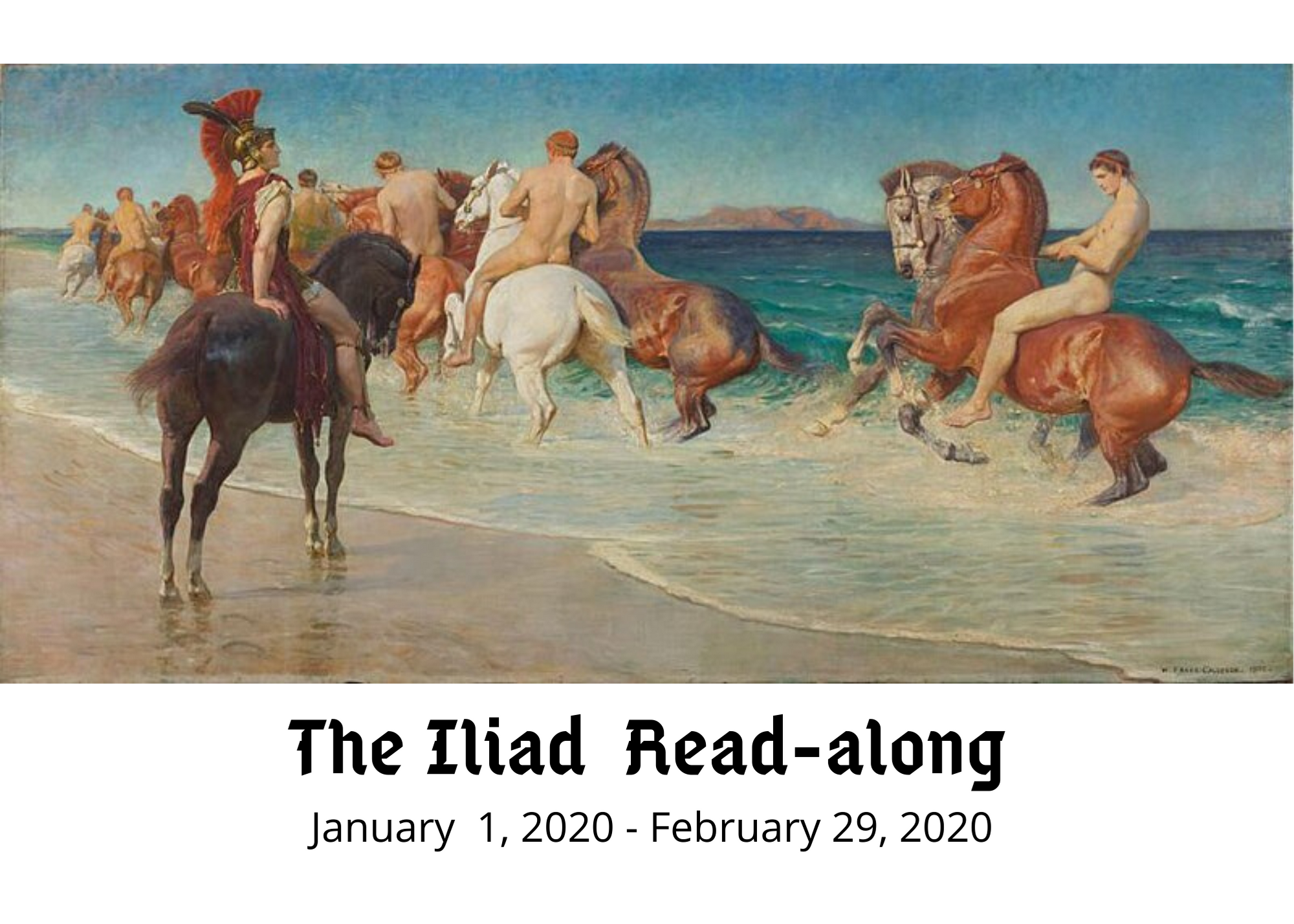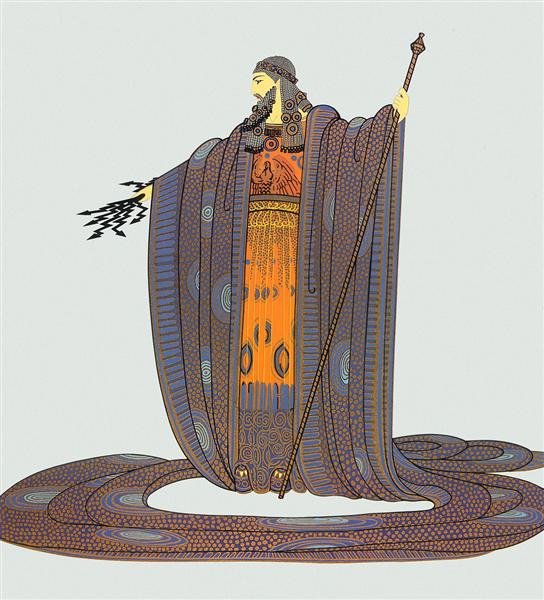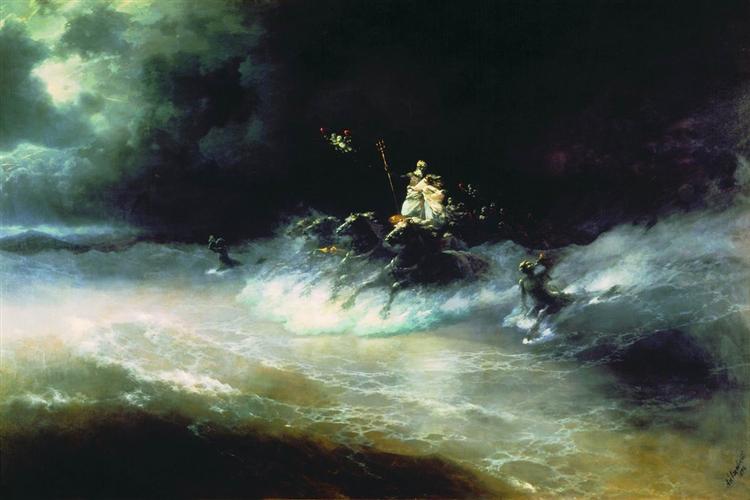
We have more battling between the two sides, with more conniving and dishonestly displayed by the gods, and Agamemnon continues to display a concerning lack of leadership.
Book XIII
While Zeus’ gaze is drawn from the battle, Poseidon arrives to rally the Argives back to battle. He first concentrates on the Aiantes, appearing as Kalchas, but the lesser Aias recognizes him as a god. Soon Poseidon has stirred up the battle spirit of the Achaians at their ships:
“Shame, you Argives, young fighting men, since I for my part
have confidence that by fighting you can save our ships from destruction;
but if you yourselves are to go slack from the sorrowful fighting
now is seen your day to be beaten down by the Trojans.
Oh for shame! ……………..”
(Line 95 – 99)
Poseidon berates Agamemnon, saying he was wrong in his treatment of Achilles and is a weak leader, as they have triumphed over the Trojans previously.
Hektor now leads a thunderous charge but is held by the newly roused Achaians. The battle continues and as Poseidon’s grandson, Amphimachos, is slain, the god stirs the Achaians to greater fury. Poseidon presently speaks to Idomeneus at his ship, as Idomeneus appears uninspired but dons his war gear, however he encounters Meriones outside. He inquires if Meriones is injured or has a message, but he has only returned to get a spear since he threw his at Deïphobos with no success. Idomeneus offers his spears, of which he has many as he’s taken them from Trojans he’s killed, then he lectures Meriones before letting him get a spear and off they go to battle. They discuss on which flank they should enter the fray and then go to battle.
We learn that Zeus and Poseidon are brothers but since Zeus is the elder, Poseidon will not openly go against him and instead, sneaks among the Achaians, while his heart is angry at his brother.
The fighting rages with the warriors taunting each other and, when the brother-in-law of Aineais is killed, Deïphobos urges him to find Idomeneus, his murderer, and avenge him. Idomeneus calls for men to shield him and then so does Aineais, as they fight over the body of Alkathoös. Paris’ guest-friend is killed and he avenges him, killing Euchenor, a man who was told he’d die at home of a terrible sickness or die at Troy, so he chose the latter.
While the Greeks are now winning on the left side, Hektor is still holding the Achaians, however while the Achaians are rallying, the Trojans are slowly losing their taste for battle. Poulydamas scolds Hektor, telling him he has the talent for battle, but one man is not given all gifts and implies he is lacking wisdom. He counsels Hektor that his forces are spread too thinly and that they should pull back and regroup. Hektor agrees, setting off to find the leaders of the Trojans, however he only finds Paris over whom he vents his anger, as he cannot find his best warriors:
“Evil Paris, beautiful, woman-crazy, cajoling:
where is Deïphobos gone, and the strength of the prince Helenos,
Adamas, Asios’ son, and Asios, son of Hyrtakos?
Where is Othryoneus? Now all steep Ilion is lost
utterly; now your own headlong destruction is certain.”
(Line 769 – 773)
Paris assure him that the warriors are injured but alive and deftly convinces his brother that all will be well and to lead on, so they join the fighting where it rages the most. Hektor attempts to shield his identity but is recognized by Aias, who taunts him, yet Hektor rejoins, calling Aias an “inarticulate ox”. The fighting rages, with both sides fighting to their utmost.
Zeus
It’s occurred to me that Zeus, while he’s giving Hektor and the Trojans success in battle, is not actually on the side of the Trojans. Instead, he’s on the side of Achilles. And Achilles is really part of the Achaian contingent, even though he will not fight. Another paradox in this exciting poem!
A Fallen Comrade
Since the Greeks believed the psyche (soul) left the body at death and went to the underworld, I’m wondering why they fought so intensely to protect dead comrades? Was it because they didn’t want the other side to get the armour and any weapons? Was it a badge of further honour, not only to kill a man, but to take his body (and/or armour/weapons) too? I’d like to learn more about this practice.
Food
It’s used as a metaphor, but in this chapter we learn the Greeks ate black beans and chickpeas!
Metaphors
Goodness, there are TONS of metaphors in this poem. So effective!
Book XIV
As he hears the outcry of battle, Nestor leaves Machaon to discover what is happening. Seeing the wall brought down, he encounters an injured Agamemnon who reveals to Nestor that he is afraid of Hektor and concerned that the Achaians will turn against him, like Achilles. Nestor, surprisingly says that since they are wounded (is Nestor wounded? I thought he just brought a wounded Machaon back to camp …???), they should not fight, whereupon Agamemnon proposes setting their ships in the water and running away. Odysseus is scandalized and has some harsh words for his commander:
“Son of Atreus, what sort of word escaped your teeth’s barrier?
Ruinous! I wish you directed some other unworthy
army, and were not lord over us, over us to whom Zeus
has appointed the accomplishing of wars, from our youth
even into our old age until we are dead, each of us.
Are you really thus eager to abandon the wide=wayed city
of the Trojans, over which we have taken so many sorrows?
Do no say it; for fear some other Achaian might hear this
word, which could never at all get past the lips of any man
who understood inside his heart how to speak soundly,
who was a sceptred king, and all the people obeyed him
in numbers like those of the Argives, whose lord you are.
Now I utterly despise your heart for the thing you have spoken;
you who in the very closing of clamorous battle
tell us to haul our strong-benched ships to the sea, so that even
more glory may befall the Trojans, who beat us already;
and headlong destruction swing our way, since the Achaians
will not hold their battle as the ships are being hauled seaward,
but will look about, and let go the exultation of fighting.
There, o leader of the people, your plan will be ruin.”
(Line 83-102)
Agamemnon admits Odysseus has “hit me somewhere deep in my feelings with this hard word,” but seeks further counsel, which he received from Diomedes. The warrior, after a speech to support his right to counsel, tells them to return to battle wounded, not necessarily to fight, but to rally their troops so they do not succumb. They all comply as Poseidon approaches Agamemnon as an old man informing him of the gods’ anger against Achilles, but how he and the Achaians will be helped in their battle for victory.
Now Hera, on Olympus, spies Poseidon assisting the Achaians and she is happy but concerned about Zeus. She concocts a plan to disguise herself in beauty to approach him and addle his brains with love so he forgets the battle. She calls upon Aphrodite to give her tremendous beauty, beguiling her with a lie as she knows Aphrodite’s loyalty is with the Trojans. On her way to Zeus, she stops to visit Sleep, requesting him to fall upon Zeus after she has lain with him, but Sleep has experienced her wiles before to his near destruction and refuses. Now, instead of gifts, she promises him one of the younger Graces to marry and this is more to his liking. And so Hera beguiles Zeus with her beauty, as she lies to him about her presence on Ida, and afterwards, sleep overcomes him. Sleep then whisks to the side of Poseidon to tell him of Zeus’ short slumber and the sea god spurs the Achaians on to even greater effort. With the best men taking the best armour and the worst, the worst, Poseidon leads the Argives and Hektor, the Trojans.
Hektor casts his spear at Aias (the Lesser) but as he draws away, Telamon Aias picks up a boulder and strikes him with it, bringing him to the ground. The Achaians scream, thinking that they can drag him away, but his Trojans brothers protect him. He is shielded as he’s taken from the battle, placed in a chariot and moved to the back of the battle. When his comrades carry him from the chariot to bath his face in the river, he vomits blood but appears to recover slightly. Meanwhile, with his injury, the Argives gain even greater determination.
They battle back and forth, “vaunting” over each other, but soon the Achaians seem to be winning the most success.
Shrinking Away from Battle
I used to think that the descriptions of warriors shrinking away into their companions and disengaging from battle was a cowardly move and wondered why so many warriors did it. But it’s finally occurred to me that when they shrink away, they have thrown their spear and are unable to retrieve it, so to stay and fight without a weapon would simply be inviting death. I suspect now that they only shrink away until they can lay hold of another weapon.
Strangely though is the fighting scene, Lines 402-420, where Hektor throws his spear at Aias and is angry because his weapon is “loosed from his hand in a vain cast,” then shrinks back into his companions, but when he is hit from a boulder from Telamon Aias, he “let fall the spear from his hand.” How did he get it back when it appeared it was originally lost among the Achaians? Did he pick up another? What ….???
Agamemnon’s Leadership
Is anyone else as disgusted with Agamemnon’s leadership as Odysseus? For the third time, he counsels running away from the battle for home. And he has no instructions or advice or opinions for the situation that they are in, but looks to others. Poseidon is actually leading the Argives/Achaians at the end of this section, with Hektor contrasted on the other side. It’s interesting that Hektor is appearing to hold his own against a god.
⇐ Book XI & Book XII Book XV & Book XVI ⇒





I will be reading this section today. I have finally decided to wait for your posts before reading the chapters.
To the Zeus being not with the Trojans but with Achilles. It could be. I need to see more if this is the case.
And to the explanation of the soldiers disengaging, yes, it could be that all they are doing is going for another spear, or positioning themselves.
I thought that the Greeks and Trojans needed to bury the bodies, because for the bodies to fall into enemies hands was a dishonor, a potential chance to be ransacked from the weapons and armor that identify one with his family, etc. So, apart from the value of the weapons, there was the need to tend to the bodies.
Isn’t the end of the Iliad what makes this need the most compelling part of the poem?
I need to pay attention to that part with Nestor, I too thought he was providing a doctor.
It’s interesting how a war is chosen to be told. How time is stretched and event stopped n order to give us the details. How individual battles are told, along with the bulk of the men. I still work to picture all this in my head. But though enjoyable and interesting, it’s difficult.
I can’t think of any other book of war like this? Maybe the knight books and knightly romances? But only The Illiad is so focused on the war AND telling us about the warriors too. It’s quite an accomplishment of humanity, this poem.
Well, you have Thucydides, The History of the Peloponnesian War but it’s a general look at war over a long number of years, not the microscopic view that Homer gives us. It’s sort of the inverse of Homer. But it’s very interesting in itself.
Sorry, I’ve been absent. I’ve had both mothers in the hospital and my own mother is still there which has been taking up tons of my time. I’m going to try to get back at it tomorrow!
Sorry to hear, Cleo. I hope your mother makes it back home soon.
Thanks for the reminder of Thucydides. I love Homer. This time I have just fallen in love with his poem.
I’m reading book XIII. There’s a line where my book says, there were others fighting in the proximity, but to that who is not a god, it’s difficult to innumerate all that happened.
There’s two pages full with beautiful images and metaphors. Yes. You are so right noticing this. I’m amazed at how much I’m loving this book. It’s something indescribable, but I understand Karen, up to yesterday, I had no latch on it at all.
I’m so glad to hear that it’s “clicked”. It’s like another language. My Swiss friend did immersion for English and Italian and she said there was a moment when it just “clicked.” I think it’s the same with Homer. If you do the work, eventually it will happen. You just need lots of patience!
Yeap. I don’t know if I have done that much work, but something here, something there, it’s all come together for me now. I’m always looking forward to going back to it, and keep reading it. All of the sudden, it doesn’t seem that long either.
I’m looking forward to your posts. I don’t mind if you are early, on time, or late. 🙂
I just got to the part where Zeus is advising Hektor to attack the ships, in the hopes that Achilles engages in battle to defend them.
I totally see your point. Zeus might be with Achilles and not the Trojans.
That’s interesting about the point you made of them fighting to protect dead comrades when they believed the psyche left the body at death. I’m wondering that it could be an honor thing. Even though they believed the psyche may have left, they could still have seen that it would still be honorable to protect the bodies as well as give them a proper burial.
Great thoughts, Karen. One person comment with the following which I think illuminates the Greeks practice with their dead:
“To the Greeks in general, proper disposal of the dead was a primary responsibility: the whole plot of “Antigone” hinges on deliberately not burying the dead. In classical times, forcing the enemy to negotiate the return of their dead was a sign of victory on the battlefield.
This idea was, as we learn from Herodotus, a matter of general agreement among the Greeks, and, in their eyes, distinguished them from various barbarians, who might have different ideas of what constituted respect.”
Sorry everyone! My mother has been in the hospital for the last month (nearly) and with travel and visit it’s taking about 5 hours out of each day for me, although I have taken some days off recently as I’m getting somewhat exhausted. I’m going to try to catch up this weekend or at least get a couple of posts up. Thanks for your patience!
So sorry Cleo! Hope your mom is doing better and also that you can get some rest.
Thanks for your kind thoughts, Karen. It’s definitely been tough and the struggle will continue a little longer. Thanks for sticking around for the read-along … your thoughts have been appreciated!
Sorry to hear about your mom. Hope things go well!
Thanks, Reese! I so appreciate your thoughts. It’s not looking good as you’ll read in my post. I will return when I can.
I’m sorry to hear about your mother, Cleo. Please take your time with this readalong. As long as it’s been around, The Iliad can still wait a little longer.
Thanks so much, Richard. It means alot to me that you took the time to comment and condole. You know, it’s strange but often I get interrupted when reading The Iliad. This is the third time now. Very odd ….. But I will complete the read-along as soon as possible!